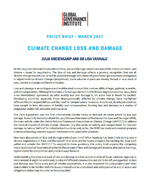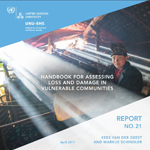-
Understanding Loss and Damage from Climate Change
July 12, 2017 By Antony Martel The idea of an insurance pool to address damage from rising sea levels started in 1991 as mere whispers, but by 2015 it grew to become Article 8 of the Paris Agreement. In Climate Change Loss and Damage, Julia Kreienkamp and Lisa Vanhala explore the history of loss and damage in international negotiations and the prospect of its future. One of the more contentious topics in climate negotiations, loss and damage confronts the culpability of wealthy states for the unavoidable consequences of climate change in more vulnerable, non-Western countries. According to Kreienkamp and Vanhala, “the urgency of the issue for developing countries will rise in inverse proportion to how much action is undertaken to mitigate and adapt to climate change.” Their report describes a number of avenues, manifested as climate risk management, for addressing loss and damage going forward, as “there is not a single solution.” They point out as a loose concept, loss and damage has ensured its survival by leaving room for interpretation, but this looseness has hamstrung further action once the term entered formal institutional mechanisms.
The idea of an insurance pool to address damage from rising sea levels started in 1991 as mere whispers, but by 2015 it grew to become Article 8 of the Paris Agreement. In Climate Change Loss and Damage, Julia Kreienkamp and Lisa Vanhala explore the history of loss and damage in international negotiations and the prospect of its future. One of the more contentious topics in climate negotiations, loss and damage confronts the culpability of wealthy states for the unavoidable consequences of climate change in more vulnerable, non-Western countries. According to Kreienkamp and Vanhala, “the urgency of the issue for developing countries will rise in inverse proportion to how much action is undertaken to mitigate and adapt to climate change.” Their report describes a number of avenues, manifested as climate risk management, for addressing loss and damage going forward, as “there is not a single solution.” They point out as a loose concept, loss and damage has ensured its survival by leaving room for interpretation, but this looseness has hamstrung further action once the term entered formal institutional mechanisms. Understanding loss and damage might be more important than measuring it, Kees Van Der Geest and Markus Schindler argue in their report, Handbook for Assessing Loss and Damage in Vulnerable Communities. Countries and organizations currently do not have a robust method for assessing loss and damage, so the authors prescribe a methodological approach, specifically for vulnerable rural communities, that evaluates what climate change deprives or damages, as well as how and why actors incur loss and damage. Instead of simply explaining the outcomes of loss and damage, Geest and Schindler attempt to identify its root causes, thus clarifying the concept and better informing public officials as they develop compensation and relief policies. Such a focus on the dynamic and complex nature of preventive and reactive measures by local actors will help policymakers develop strategies for addressing climate issues in the future.
Understanding loss and damage might be more important than measuring it, Kees Van Der Geest and Markus Schindler argue in their report, Handbook for Assessing Loss and Damage in Vulnerable Communities. Countries and organizations currently do not have a robust method for assessing loss and damage, so the authors prescribe a methodological approach, specifically for vulnerable rural communities, that evaluates what climate change deprives or damages, as well as how and why actors incur loss and damage. Instead of simply explaining the outcomes of loss and damage, Geest and Schindler attempt to identify its root causes, thus clarifying the concept and better informing public officials as they develop compensation and relief policies. Such a focus on the dynamic and complex nature of preventive and reactive measures by local actors will help policymakers develop strategies for addressing climate issues in the future.Sources: Global Governance Institute, United Nations University
 A Publication of the Stimson Center.
A Publication of the Stimson Center.

 The idea of an insurance pool to address damage from rising sea levels started in 1991 as mere whispers, but by 2015 it grew to become Article 8 of the
The idea of an insurance pool to address damage from rising sea levels started in 1991 as mere whispers, but by 2015 it grew to become Article 8 of the  Understanding
Understanding

